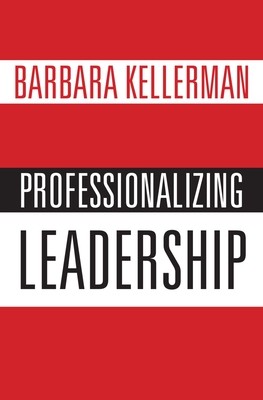
- We will send in 10–14 business days.
- Author: Barbara Kellerman
- Publisher: Oxford University Press, USA
- ISBN-10: 0190695781
- ISBN-13: 9780190695781
- Format: 16.3 x 23.6 x 2.3 cm, kieti viršeliai
- Language: English
- SAVE -10% with code: EXTRA
Reviews
Description
Over the last 40 years, the leadership industry has grown exponentially. Yet leadership education, training, and development still fall far short. Moreover, leaders are demeaned, degraded, and derided as they never were before. Why?
The problem is leadership has stayed stuck. It has remained an occupation instead of becoming a profession. Unlike medicine and law, leadership has no core curriculum considered essential. It has no widely agreed on metric, or criteria for qualification. And it has no professional association to oversee the conduct of its members or assure minimum standards. Professionalizing Leadership looks to a past in which learning to lead was the most important of eruditions. It looks to a present in which learning to lead is as effortless as ubiquitous. And it looks to a future in which learning to be a leader might look different altogether - it might resemble the far more rigorous process of learning to be a doctor or a lawyer. As it stands now, the military is the only major American institution that gets it right. It assumes leadership is a profession that requires those who practice it to be taught in accordance with high professional standards. Barbara Kellerman draws on the militaryexperience specifically to develop a template for learning how to lead generally. Leadership in the first quarter of the present century is different from what it was even in the last quarter of the past century - which is why leadership taught casually and carelessly should no longer suffice. Professionalizing Leadership addresses precisely the problem of how to prepare leaders in accordance with professional norms. It provides the template necessary for transforming leadership from dubious occupation to respectable profession.
EXTRA 10 % discount with code: EXTRA
The promotion ends in 21d.20:50:27
The discount code is valid when purchasing from 10 €. Discounts do not stack.
- Author: Barbara Kellerman
- Publisher: Oxford University Press, USA
- ISBN-10: 0190695781
- ISBN-13: 9780190695781
- Format: 16.3 x 23.6 x 2.3 cm, kieti viršeliai
- Language: English English
Over the last 40 years, the leadership industry has grown exponentially. Yet leadership education, training, and development still fall far short. Moreover, leaders are demeaned, degraded, and derided as they never were before. Why?
The problem is leadership has stayed stuck. It has remained an occupation instead of becoming a profession. Unlike medicine and law, leadership has no core curriculum considered essential. It has no widely agreed on metric, or criteria for qualification. And it has no professional association to oversee the conduct of its members or assure minimum standards. Professionalizing Leadership looks to a past in which learning to lead was the most important of eruditions. It looks to a present in which learning to lead is as effortless as ubiquitous. And it looks to a future in which learning to be a leader might look different altogether - it might resemble the far more rigorous process of learning to be a doctor or a lawyer. As it stands now, the military is the only major American institution that gets it right. It assumes leadership is a profession that requires those who practice it to be taught in accordance with high professional standards. Barbara Kellerman draws on the militaryexperience specifically to develop a template for learning how to lead generally. Leadership in the first quarter of the present century is different from what it was even in the last quarter of the past century - which is why leadership taught casually and carelessly should no longer suffice. Professionalizing Leadership addresses precisely the problem of how to prepare leaders in accordance with professional norms. It provides the template necessary for transforming leadership from dubious occupation to respectable profession.


Reviews